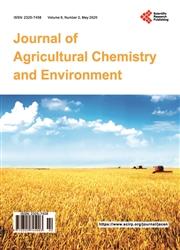Chemical and Biological Properties of Apple Orchard Soils under Natural, Organic, Hybrid, and Conventional Farming Methods
引用次数: 8
Abstract
Apples in Japan are generally cultivated under management systems that use chemical fertilizers and synthetic chemical pesticides. However, the continuous use of these fertilizers and pesticides damages the soil environment and reduces the number of soil microorganisms. In this study, we compared the chemical and biological properties of 12 soils from apple orchards in Aomori and Nagano Prefectures under four types of management systems, namely, natural conditions, with no cultivation, fertilizers, or pesticides; organic farming methods, using organic materials and pesticides approved by the Japanese Agricultural Standard organic certification system; hybrid farming methods, using a mix of organic and chemical fertilizers; and conventional farming, using chemical fertilizers and pesticides. Soil total carbon (TC), total nitrogen (TN), total phosphorus (TP), nitrate-nitrogen (NO? 3), and available phosphoric acid (SP) contents were generally found to be the highest where organic farming methods were used. Similarly, bacterial biomass, nitrification (N) circulation activity, ammonia (NH+ 4) oxidation activity, nitrite (NO? 2) oxidation activity, and phosphoric (P) circulation activity were the highest under organic farming, especially in comparison with conventional farming. This study indicated that the differences in apple sugar content, acidity, and sugar/acidity ratio between different orchard management systems were due to different soil conditions, and soil conditions under organic farming management system in apple cultivation increased bacterial biomass while enhancing N and P circulation activity and high TC. On the other hand, the soil of conventional farming has the lowest total number of bacterial biomass and lowest material cycle such as N and P circulation activity. Analysis of the chemical and biological properties of these orchard soils indicated that soil conditions under organic farming management are the most suitable for increasing microbial numbers and enhancing N and P circulation activity.自然、有机、杂交和常规耕作方法下苹果园土壤的化学和生物特性
在日本,苹果一般是在使用化肥和合成化学农药的管理系统下种植的。然而,这些肥料和农药的持续使用破坏了土壤环境,减少了土壤微生物的数量。在本研究中,我们比较了青森县和长野县12个苹果园土壤在4种管理制度下的化学和生物学特性,即自然条件下,不耕种,不施肥,不施用农药;采用有机耕作方法,使用经日本农业标准批准的有机材料和农药认证体系;混合耕作方法,使用有机和化学肥料的混合;以及使用化肥和杀虫剂的传统农业。土壤全碳(TC)、全氮(TN)、全磷(TP)、硝态氮(NO?3),有效磷酸(SP)含量普遍在采用有机耕作方式的地区最高。同样,细菌生物量、硝化(N)循环活性、氨(NH+ 4)氧化活性、亚硝酸盐(NO?2)有机耕作方式下土壤的氧化活性和磷循环活性最高,特别是与常规耕作方式相比。研究表明,不同果园管理制度下苹果含糖量、酸度、糖酸比的差异是由不同土壤条件决定的,苹果有机耕作管理制度下土壤条件增加了细菌生物量,提高了氮、磷循环活性和高TC。另一方面,传统耕作方式土壤细菌总生物量最低,氮、磷循环活性等物质循环最低。对果园土壤的化学和生物学特性分析表明,有机耕作管理下的土壤条件最适合增加微生物数量和提高氮、磷循环活性。
本文章由计算机程序翻译,如有差异,请以英文原文为准。
求助全文
约1分钟内获得全文
求助全文

 求助内容:
求助内容: 应助结果提醒方式:
应助结果提醒方式:


